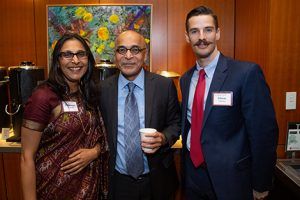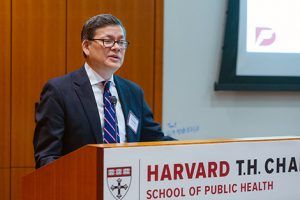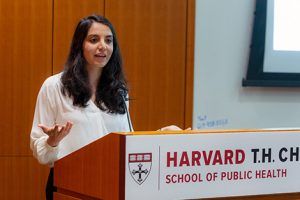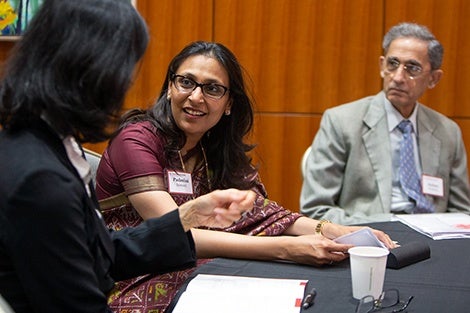May 3, 2019—Oral cancer is on the rise in India, with more than 100,000 new cases in 2018, according to the Global Cancer Observatory. At a recent symposium hosted by Harvard T.H. Chan School of Public Health’s India Research Center, experts from India and Harvard’s Longwood Medical Area came together to share the latest research on preventing, diagnosing, and treating oral cancer. Much of the program focused on how to address the disease in India, which speakers said is known as the “oral cancer capital of the world.”
The idea for the event, held April 30, 2019 at the Joseph B. Martin Conference Center, grew out of trip to India that Dean Michelle Williams took in 2017. There, she met Padmini Somani, founder of the Salaam Bombay Foundation and a member of the India Research Center’s Advisory Board, and surgical oncologist Sultan Pradhan, both of whom spoke at the symposium. Williams said in opening remarks that she was “deeply impressed by their tireless commitment to reducing tobacco use and improving treatment for those with oral cancer.”

In a keynote address, Pradhan said that while some cancer surgeries can be performed by general surgeons, oral cancer requires specialized training. The number of specialists in India is slowly increasing, but there are far too few to meet the needs of most of the population. Those who can’t afford private hospitals must camp out in front of a public hospital in Mumbai on what Pradhan called the “street of sorrows” to wait for a rare appointment with a physician. By the time they are seen, it is often too late, he said.
One of the factors helping drive India’s oral cancer problem are the cheap, colorful packets of chewing tobacco that kids snap up like candy. Somani described her foundation’s work to steer kids away from tobacco use by engaging them in anti-tobacco campaigns and helping boost their life skills and confidence through sports, arts, and cultural activities. The program now reaches 50,000 schools across India, involving more than 13 million children. Glorian Sorensen, professor of social and behavioral sciences at Harvard Chan School, said that she and colleagues are working on tobacco-control programs focused on reducing use among schoolteachers.

Precision prevention can be a way to supplement these kinds of population-level approaches, said Tim Rebbeck, Vincent L. Gregory, Jr. Professor of Cancer Prevention and director of the Zhu Family Center for Global Cancer Prevention, one of the institutional co-sponsors of the symposium. People can respond differently to cancer prevention methods like chemotherapy or surgery, Rebbeck said. Drawing on biologic, behavioral, socioeconomic, and epidemiologic data, precision prevention can devise a more tailored strategy for an individual or group of individuals.

In India, there are significant gaps in data around who is diagnosed and dying from cancer, said Amiya Bhatia, MPH ’15, SD ’19, particularly in rural areas. She said that more accurate cancer registries are urgently needed in India and in other countries in Asia and Africa to help guide prevention and treatment efforts.
During a series of presentations focused on diagnosis and treatment of oral cancer, researchers described how photodynamic therapy—a treatment common in dermatologists’ offices that uses light and a photosensitizing chemical to induce cell death—can be an effective low-cost option for some patients in resource-limited areas.
K. “Vish” Viswanath, Lee Kum Kee Professor of Health Communication and director of the India Research Center, said that the event was an example of the type of “bilateral exchange” of research and ideas that he hopes to foster. He said that the Center will continue to bring experts together to advance work on stemming oral cancer in India.
Photos: Lisa Abitbol
